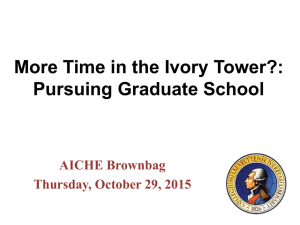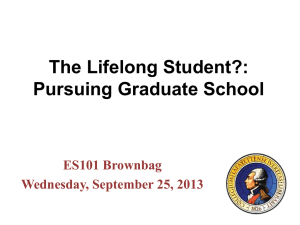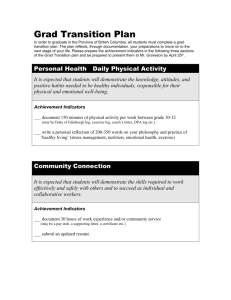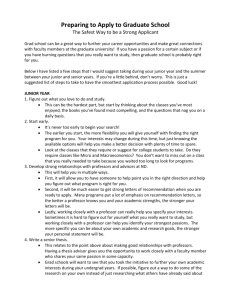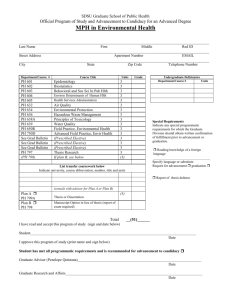Pursuing Graduate School
advertisement
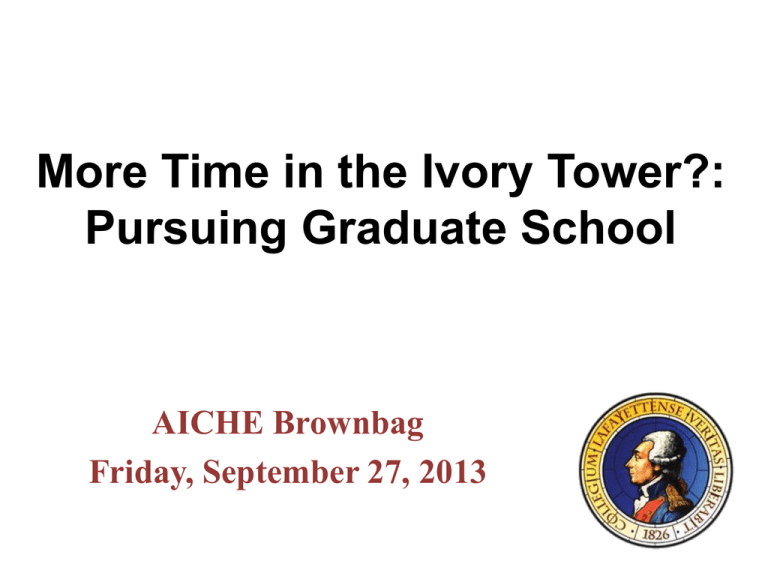
More Time in the Ivory Tower?: Pursuing Graduate School AICHE Brownbag Friday, September 27, 2013 Today’s Brownbag • • • • Is graduate school for you? What does graduate school entail? Master’s vs. Ph.D.? Slides will be available on Lafayette chapter AICHE sites (sites.lafayette.edu/aiche) Why Choose Graduate School? • Graduate school is not for everybody. • On average, a 5-6 year (Ph.D.) investment of time – Master’s programs usually run 1-2 years. • People who enter grad school should be: – Self-motivated – Inquisitive about engineering AND science – Interested in why things are happening, not just what is happening – Willing to handle failure and learn from it – Unafraid to ask questions Undergraduate vs. Graduate • UG is (primarily) closed-ended problems where a solution can be found following some procedure. • A Ph.D. involves solving openended problems where the solution is unknown and the path to solving the problem is often murky at best. – You will be the expert. • Graduate school will enhance and develop your analytical skills to allow you to solve any problem. What are the Requirements of a ChE Ph.D.? Grouping Description Coursework Advanced courses in thermo, transport, kinetics and applied math. Science/engineering electives Most completed in first two years Qualifiers Show competence in coursework and/or ability to conduct research Teaching (most) 1 or 2 courses as a teaching assistant Oral/Poster Presentation Work presented at symposiums or conferences Publications 1-4 (Varies from school to school and from research group to research group) Thesis Compilation of original research Final approval from research advisor and thesis committee (2 or 3 in department, at least 1 external) Am I Going to Accumulate Loans? • In virtually all ChemE Ph.D. programs (and most other science/engineering), no. • Research is funded by a wide range of entities. – Covers cost of “employees” (grad students et al.) • • • • Tuition/fees Stipend (~$20-30,000, dependent on school) Health care (typically) Attendance at conferences (% coverage varies) Fellowships • Highly competitive (grades, research, etc.) • Typically (slightly) higher stipend than other graduate students • Potentially more freedom in advisor selection. • Sample fellowships: – NSF (National Science Foundation, http://www.nsfgrfp.org/) – NDSEG (National Defense Science and Engineering, http://ndseg.asee.org/) – Hertz Foundation (http://www.hertzfoundation.org) Ashley Kaminski (‘13) NSF Recipient (now at Cornell BME) Lauren Huyett (‘11) NSF Recipient (now at UC Santa Barbara ChE) Will I Like Research? • The best way to find out is by actually completing research. • At Lafayette – Excel program (the earlier, the better) – Can go outside of the major Ankit Chandra (‘12) (now at Cornell ChBE) • Externally – Summer REU programs (http://www.nsf.gov/crssprgm/re u/list_result.cfm?unitid=10006) – Other federal/university level organizations (NSF, NIH, etc.) Hallie Zeller (ME, ‘12) (now at Brown ME) Applying For Grad School • Typically due around January 1 (variation exists) Requirement Description Transcript Imperfect grades can be overcome by quality undergrad research GRE Not as important as you may think, but still required Personal Statement 1-2 pages discussing why you want to attend grad school (and the particular school) and what makes you a good candidate. Letters of Recommendation 3 letters is a typical minimum. All recommenders do not have to be from the major. Provide ample time, a resume and an update to your recommenders. Application Cost Money (Some schools waive application fees.) Sample ChBE Honors Theses Student Thesis Title Advisor Current Asad Akram (‘12) Shell Encapsulation and Formation in Microfluidic Channels Levinson Bioformix Inc. (Process Engr.) Scott Albert (’12) Numerical Simulation of Blood Flow in the Renal Arteries: Influence of the Renal Ostium Flow Diverter J. Rossmann (ME) Johns Hopkins (BME Ph.D.) Melissa Gordon (‘10) Breaking the Mold: Optimization of Voxel Resolution in Materials-Additive Manufacturing Ferri Princeton (ChE Ph.D.) Aaditya Khanal (‘11) Microalgae to biodiesel: Investigating the growth rate and lipid content of several microalgae strains Tavakoli, Piergiovanni U. of Houston (ChE Ph.D.) Kevin Ling (‘11) Gene expression on thermo-responsive polymer brushes with a tunable LCST L. Anderson Georgia Tech (ChE Ph.D.) Hallie Zeller (‘11 ME) Deconvoluting cohesion and adhesion in E. coli D21g biofilms Ferri Brown (ME Ph.D.) How Do I Pick a Grad School? • Researching schools is important – Most to all research groups have a group website where a flavor of their work is available. (upkeep) – Advice/input from faculty/recent alumni • What are your research interests? – Any particular area of interest (energy, bio, etc.)? – Experimental? Computational? Both? • The school – Prestige (be careful) – Location (size/weather/rural vs. urban) – Number of professors interested in (be careful) Senior Year Timeline • Research potential schools • Ask faculty or others for advice/insight • Look into fellowships (NSF etc.) • Take GRE • Ensure letters of recommendation have been completed and sent • Submit application • Narrow list of potential schools • Ask for letters of recommendation • Send e-mails to faculty you are interested in. • Prepping applications (GRE, personal statement) Sept. Dec. • Recruiting weekends • Notification of acceptance • Notification of award package Jan. Feb. • Final decisions Apr. What Can I Do with a Ph.D. (Besides be a Professor)? • Your thesis research will represent a little slice of science/engineering that you are the expert. • You may be expected to: – Conduct research to answer an industrial question – Oversee others completing experiments/simulations • Types of jobs: – Senior Engineer – Research Scientist (R&D (generally) has a glass ceiling without a Ph.D.) – Consultant Where are They Now?: Postdocs Where are They Now?: Jobs Where Have They Went?: Laf ChBE Grad Schools (Classes of 2011-2013) PhD in ChE PhD in BME or Polymers Master’s A Brief Aside: My Story • My thesis title: “Assessing the Role of Polydispersity and Cocrystallization on Crystallizing n-Alkanes in n-Alkane Solutions” Some Pros and Cons of Graduate School • You lead the path • Cutting-edge research and equipment • Meet and work with experts in the field • Conference travel • Scheduling flexibility • College environment • Launching point for more lucrative work • • • • • • • You lead the path Can be (at times) isolating Frustrating Not 9 (or 8) to 5 job Financial issues College environment Tough (NOT impossible) to start a family Master’s Degrees • Useful if desired to gain particular specialization – – – – – Polymer science Environmental science Biotechnology Business (MBA’s) Engineering management • Master’s in ChE w/bachelor’s in ChE is not generally useful. • Minimal to no financial assistance provided – Company funded MBA is an exception. Master’s of Engineering Management • Degree gaining popularity in the last five to ten years. • Known as “the Engineer’s MBA” – Combination of professional engineering practice and core business principles – Jobs can range from financial analyst to plant manager to strategy consulting manager • Related to engineering studies • Good resource to start: http://www.mempc.org/index.htm A Few Parting Words • Don’t choose grad school solely because finding a job is difficult. • Grad school will change the way you think and approach problems. • Even though it’s not industry, networking is just as important in grad school. • What you get out of grad school is directly related to what you put into it.
